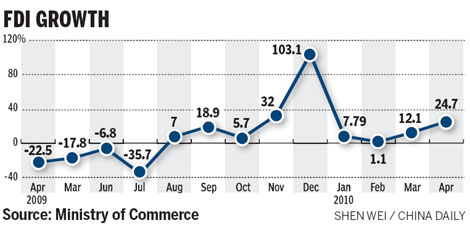FDI Rise Indicates Confidence
Adjust font size:
China's foreign direct investment (FDI) grew by nearly 25 percent in April, an indication that the country remains a favorite destination for foreign capital.

The Ministry of Commerce said on its website on Friday that China's FDI last month grew by 24.7 percent from a year earlier to hit US$7.35 billion. From January to April, China attracted investment worth US$30.8 billion, up 11.3 percent year-on-year.
April is the ninth consecutive month that China has recorded monthly growth in FDI. Bloomberg News had predicted a growth of 21 percent based on a survey of six economists.
"The strong growth, even higher than the previous month, shows the government's measures to create a more business-friendly environment for the FDI are working nicely," said Wang Zhile, director of the research center on transnational corporations under the Ministry of Commerce.
"As China's economic power grows amid the global recovery, not only as a large exporter but also a potentially huge consumer, the nation will have more foreign investment continuously piling in, and the nation is and will continue to be a much more attractive destination for FDI," he added.
Responding to increasing complaints from foreign enterprises on the deteriorating environment in the wake of the Google and Rio Tinto cases, the State Council in early April announced new measures including preferential policies for land use and tax, encouraging investment into renewable energy, high-technology and service industries, and moves into central and western China.
A key measure allows local authorities to approve foreign projects up to $300 million, compared with a previous cap of US$100 million.
As part of the coordinated measures of the State Council policy, the State Administration for Industry and Commerce on Thursday released guidelines for further development of the FDI, and Vice-Minister of Commerce Ma Xiuhong also said last week the ministry is discussing detailed measures tailored for foreign businesses.
During the first quarter, China's gross domestic product grew 11.9 percent, the fastest pace in three years. China is widely expected to pass Japan as the world's second largest economy this year, despite concerns economic growth may slow in the second half.
China is under pressure, especially from the United States, to appreciate the renminbi, and many expect the country to do so in the coming months. The nation pegged the yuan to the dollar in July 2008 after the currency appreciated 21 percent in three years.
"It's true that China has made progress for bettering its foreign investment environment, but we still look forward to future progress," said Cameron Kerry, general counsel of the United States Department of Commerce, during his recent Beijing visit.
US Secretary of Commerce Gary Locke, together with a trade mission, arrives in China on Saturday to start a 10-day visit, with discussions expected to take place on a more open trade and investment environment.
Volkswagen AG, the world's second largest auto maker, said in late April it would add another 1.6 billion euros (US$2 billion) to establish another two factories in China, while American and European markets are still sluggish. On Wednesday, Molson Coors, the world's fifth-largest brewer, agreed to pay US$40 million for a 51 percent stake in a new joint venture in China, in a bid to cash in on the growing beer consumption market.
The European debt crisis, which has spread to many European nations and is still affecting the US economy, is adding uncertainties to the attractiveness of developed nations and is helping global investors gain more confidence in emerging markets like China, said analysts.
"It's too early to make a conclusion that the April growth is mainly attributable to government policies," said Yan Jinny, an economist from the Standard Chartered Shanghai.
"Foreign businesses' enthusiasm was not dampened by the occurrence of individual negative cases in China."
Premier Wen Jiabao said during his meeting with EU Commission President Jose Manuel Durao Barroso in late April that China will provide foreign businesses equal treatment with their local counterparts, and all foreign businesses with operations in China will be regarded as Chinese companies.
In the first quarter, China's FDI in the service sector rose by 25.4 percent to US$10.6 billion, while the manufacturing sector dropped 10.3 percent. The service industry accounted for 45 percent of the investment, said the Ministry of Commerce.
(China Daily May 15, 2010)